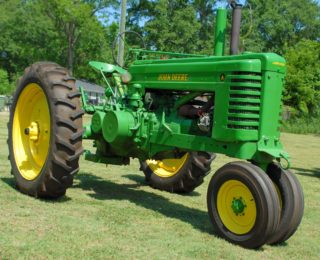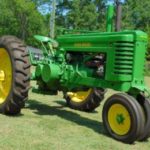California Sales Tax: Good News for Cultivators!
California Sales Tax: Good News for Cultivators!

Your standard CDTFA qualified cannabis tractor.California cannabis businesses are now acquiring temporary permits to enter the new cannabis marketplace made possible under MAURSCA. As part of that process, all cannabis businesses have been introduced to the California Department of Fee and Tax Administration (“CDTFA”), the agency tasked with administering the new cannabis cultivation taxes and sales tax.
The CDTFA administers sales tax exemptions on purchases of certain farm equipment and agriculture products. These exemptions are available to cultivators, processors and manufacturers. California sales tax rates are high – ranging from 7.25% to 10.25% of the sales price. Sales tax savings go directly to the bottom-line and a business could save up to $1,025 on every $10,000 invested in eligible supplies and equipment.
This post provides a quick outline of California sales tax exemptions available to cultivators. A second post will cover licensed processors and manufactures.
Seeds and Plants
The sale of seeds and plants are exempt from sales tax so long as the purchaser uses those seeds and plants to create products sold in the regular course of business. Plants include “cuttings of every variety”. Consequently, a cultivator should be able to purchase clones and plants exempt from sales tax. To document the exemption, a cultivator must give a seller an exemption certificate.
Fertilizers
The sale of certain fertilizers is exempt from sales tax so long as the fertilizer is applied to land or in “foliar application” where the products of such plants (i.e., cannabis) are sold in the regular course of business. Only very specific types of fertilizers and nutrients qualify and the definitions are highly technical. For example, “commercial fertilizer” and “agricultural minerals” qualify. These substances generally contain combinations of nitrogen, phosphoric acid and potash under 5%. On the other hand, “packaged soil amendments” (i.e., hay, straw, peat moss) do not qualify. To document the exemption, a cultivator must give a seller an exemption certificate.
Farm Equipment and Machinery
As a rule, the sale of farm equipment and machinery is taxable. However, the purchase of certain farm equipment and machinery is partially exempt from sales tax. The partial exemption is currently 5% of the sales price. For example, the sales tax rate on the purchase of eligible equipment in Arcata is 3.5% (8.5%-5.0%); resulting in a $500 savings on the purchase of $10,000 worth of equipment.
Three requirements must be met to take the credit. The first and most problematic requirement, is that the purchaser’s business must fall within specific federal SIC codes. SIC codes are created by the federal government to track statistical information on U.S. businesses. Because cannabis is illegal under federal law, no specific SIC code is currently available for the sale of consumable cannabis. Nonetheless, a cultivator may argue that their business operation meets this requirement because it is included in the general farm category of SIC 0191.
The second requirement is that the equipment should be used at least 50% or more in harvesting agricultural product. The third, requirement is that the equipment should be farm equipment and machinery as defined under regulations. The regulations broadly define farm equipment and machinery. The CDTFA has identified the following equipment as qualifying for the exemption:
Planting equipment;
Trimming Tools;
Drying racks and trays;
Grow tents and lights;
Environmental controls;
Hydroponic equipment;
Irrigation equipment;
Hand tools;
Repair and replacement parts;
Wind machines.
Vehicles that are designed to be used exclusively on roads and highways, such as pick-up trucks, do not qualify. To document the exemption, a cultivator must give a seller an exemption certificate, Form CDTFA-230-D.
Buildings for Raising Plants
Certain buildings are considered farm equipment for purposes of the farm equipment and machinery exemption discussed above. Generally, they must be single purpose structures and do not include structures used for storage or administrative purposes. The buildings must:
Be specifically designed for commercially raising plants;
Used exclusively for that purpose.
For example, a greenhouse would generally qualify. To document the exemption, a cultivator must give the seller an exemption certificate, Form CDTFA 230-D.
Solar Power Facilities
A business that otherwise qualifies for the farm equipment partial exemption, may purchase certain solar equipment at the reduced sales tax rate.
In general, solar power equipment used at least 50% in the production of cannabis would qualify for the farm equipment and machinery partial exemption. Solar power equipment may qualify even if the equipment is tied to the local power grid.
For example, a solar facility producing a total 1000 kw of electricity per year would qualify so long as at least 500 kw per year was used to power the cultivator’s farm equipment and machinery. Note that in this example, the cultivator could sell on the open market the excess 500kw of electricity. Potentially, the cultivator can deduct on its federal income tax return all expenses related to this separate power distribution business.
Diesel Fuel Used in Farming
The purchase of diesel fuel is generally subject to sales tax; however, a partial exemption from sales tax of 5.0% applies to the purchases of diesel fuel used in farming activity or in transporting product to a manufacturer or a distributor. The computation for this sales tax exemption is the same as for the exemption for farm machinery and equipment. To obtain the partial exemption, a cultivator must present to the seller an exemption certificate, Form CDTFA-230-G.
Furthermore, California imposes a $0.36 per gallon excise tax the sale of diesel fuel. However, a cultivator may purchase diesel fuel used to power farm equipment exempt from the diesel fuel excise tax. To obtain the exemption, a cultivator must present to the seller an exemption certificate, Form CDTFA-608 REV.
Liquid Propane Gas Used in Farming
Sales of liquid propane gas used to operate machinery used in farming or harvesting are fully exempt from sales tax. To obtain the full exemption, a cultivator must present to the seller an exemption certificate, Form CDTFA 230-N REV.
Conclusion
As cultivators make capital investments in their cannabis operations, they have an opportunity reduce the amount of sales tax they pay on their purchase of certain consumables and high-ticket items. These exemptions provide bottom-line savings; however, the CDTFA strictly enforces compliance in this area. Accordingly, cultivators should keep meticulous books and records and ensure that they issue completed exemption certificates on these purchases, and check in with a qualified CPA or tax lawyer with any questions.
Go to Source
Powered by WPeMatico
